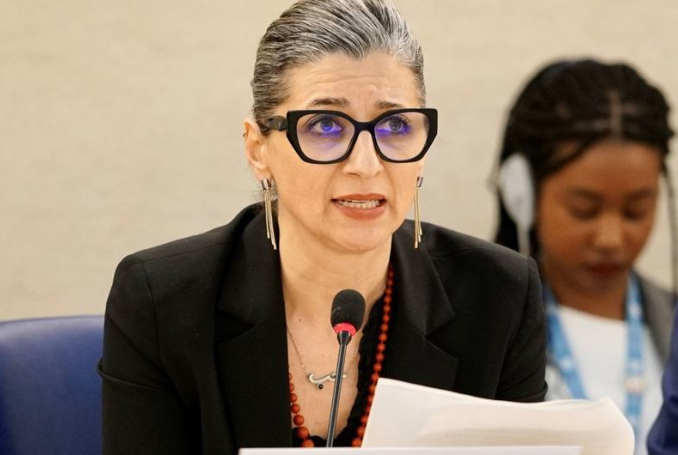End of Empathy: Did the Gaza Genocide Render the UN Irrelevant?

UN Special Rapporteur on the Situation in Palestine Francesca Albanese. (Photo: UN Human Rights Council/Sérine Meradji, via UN News)
By Ramzy Baroud
Francesca Albanese did not mince her words. In a strongly worded speech at the United Nations General Assembly Third Committee on October 29, the UN Special Rapporteur deviated from the typical line of other UN officials. She directed her statements to those in attendance.
“Is it possible that after 42,000 people killed, you cannot empathize with the Palestinians?” Albanese said in her statement about the need to “recognize (Israel’s war on Gaza) as a genocide”. “Those of you who have not uttered a word about what is happening in Gaza demonstrate that empathy has evaporated from this room,” she added.
Was Albanese too idealistic when she chose to appeal to empathy, which, in her words, represents “the glue that makes us stand united as humanity”?
The answer largely depends on how we wish to define the role being played by the UN and its various institutions; whether its global platform was established as a guarantor of peace, or as a political club for those with military might and political power to impose their agendas on the rest of the world?
Albanese is not the first person to express deep frustration with the institutional, let alone the moral collapse of the UN, or the inability of the institution to affect any kind of tangible change, especially during times of great crises.
The UN’s own Secretary-General Antonio Guterres himself had accused the executive branch of the UN, the Security Council, of being “outdated”, “unfair” and an “ineffective system”.
“The truth is that the Security Council has systematically failed in relation to the capacity to put an end to the most dramatic conflicts that we face today,” he said, referring to “Sudan, Gaza, Ukraine”. Also, although noting that “The UN is not the Security Council”, Guterres acknowledged that all UN bodies “suffer from the fact that the people look at them and think, ‘Well, but the Security Council has failed us.’”
Some UN officials, however, are mainly concerned about how the UN’s failure is compromising the standing of the international system, thus whatever remains of their own credibility. But some, like Albanese, are indeed driven by an overriding sense of humanity.
On October 28, 2023, mere weeks after the start of the war, the director of the New York office of the UN High Commissioner for Human Rights left his post because he could no longer find any room to reconcile between the failure to stop the war in Gaza and the credibility of the institution.
“This will be my last communication to you,” Craig Mokhiber wrote to the UN high commissioner in Geneva, Volker Turk. “Once again we are seeing a genocide unfolding before our eyes and the organization we serve appears powerless to stop it,” Mokhiber added.
The phrase “once again” may explain why the UN official made his decision to leave shortly after the start of the war. He felt that history was repeating itself, in all its gory details, while the international community remained divided between powerlessness and apathy.
The problem is multilayered, complicated by the fact that UN officials and employees do not have the power to alter the very skewed structure of the world’s largest political institution. That power lies in the hands of those who wield political, military, financial and veto power.
Within that context, countries like Israel can do whatever they want, including outlawing the very UN organizations that have been commissioned to uphold international law, as the Israeli Knesset did on October 28 when it passed a law banning UNRWA from conducting “any activity” or providing services in Israel and the occupied territories.
But is there a way out?
Many, especially in the global south, believe that the UN has outlived its usefulness or needs serious reforms.
These assessments are valid, based on this simple maxim: The UN was established in 1945 with the main objectives of the “maintenance of international peace and security, the promotion of the well-being of the peoples of the world, and international cooperation to these ends.”
Very little of the above commitment has been achieved. In fact, not only has the UN failed at that primary mission, but it has become a manifestation of the unequaled distribution of power among its members.
Though the UN was formed following the atrocities of WWII, now it stands largely useless in its inability to stop similar atrocities in Palestine, Lebanon, Sudan and elsewhere.
In her speech, Albanese pointed out that if the UN’s failures continue, its mandate will become even “more and more irrelevant to the rest of the world”, especially during these times of turmoil.
Albanese is right, of course, but considering the irreversible damage that has already taken place, one can hardly find a moral, let alone rational justification of why the UN, at least in its current form, should continue to exist.
Now that the Global South is finally rising with its own political, economic and legal initiatives, it is time for these new bodies to either offer a complete alternative to the UN or push for serious and irreversible reforms in the organization.
Either that or the international system will continue to be defined by nothing but apathy and self-interest.
– Dr. Ramzy Baroud is a journalist, author and the Editor of The Palestine Chronicle. He is the author of six books. His latest book, co-edited with Ilan Pappé, is ‘Our Vision for Liberation: Engaged Palestinian Leaders and Intellectuals Speak Out’. His other books include ‘My Father was a Freedom Fighter’ and ‘The Last Earth’. Baroud is a Non-resident Senior Research Fellow at the Center for Islam and Global Affairs (CIGA). His website is www.ramzybaroud.net










































0 Comments